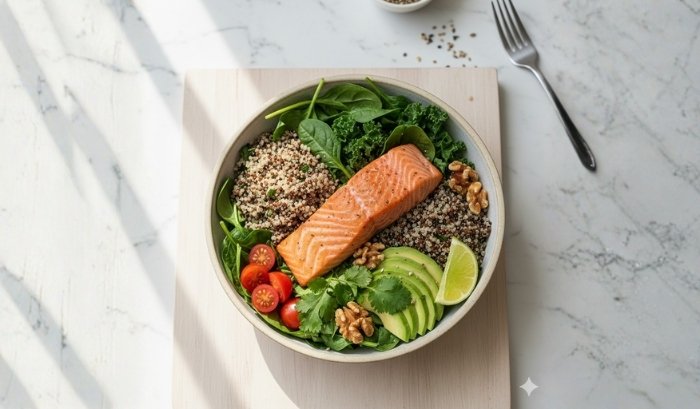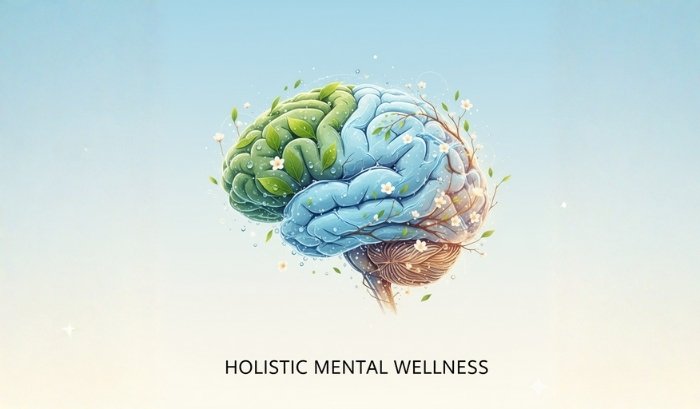Improving your mental health naturally involves a holistic approach that nurtures your mind and body. The most effective methods focus on foundational habits like getting quality sleep, eating a nutrient-rich diet, staying physically active, and maintaining strong social connections. By making small, consistent changes in these areas, you can significantly enhance your overall mental wellbeing.
This comprehensive guide will walk you through actionable, science-backed strategies to boost your brain health and improve your mood. We’ll explore how specific foods, daily habits, and lifestyle adjustments work together to support your cognitive and emotional resilience.
Table of Contents
The Core Pillars of Natural Mental Wellness
The journey to better mental health starts with understanding its foundations. Think of your mind like a high-performance engine; it requires the right fuel, regular maintenance, and proper rest to run smoothly. The core pillars supporting your mental wellbeing are your diet, physical activity, sleep patterns, and social connections. Each one plays a distinct yet interconnected role in how you feel, think, and function every day.
We’ll dive into each of these pillars, providing practical steps and expert insights to help you build a stronger, more resilient mind.
Fuel Your Brain for Optimal Function

What you eat directly impacts your brain’s structure and function. Your brain is an energy-intensive organ, consuming about 20% of your body’s calories. Providing it with high-quality nutrients is essential for maintaining sharp cognitive function and a stable mood. A diet rich in specific compounds can protect your brain cells, enhance communication between them, and provide steady energy.
The Power of Omega-3 Fatty Acids
Omega-3 fatty acids are a type of polyunsaturated fat crucial for building and maintaining healthy neurons, the fundamental cells of your brain. Two of the most important omega-3s are EPA (eicosapentaenoic acid) and DHA (docosahexaenoic acid).
- DHA is a primary structural component of the brain and retina. It’s vital for maintaining the fluidity of cell membranes, which allows for efficient communication between brain cells.
- EPA has powerful anti-inflammatory effects, which can help protect the brain from cellular damage and support mood regulation.
Studies have shown that a regular intake of omega-3s is associated with a lower risk of depression and may help improve symptoms in those already affected. For example, a 2019 meta-analysis published in Translational Psychiatry found that omega-3 supplementation had a beneficial effect on individuals with major depressive disorder.
Personal Experience: A Client’s Journey
I once worked with a college student, Alex, who was struggling with intense brain fog and low mood, especially during exam season. He relied heavily on caffeine and sugary snacks. We started by incorporating omega-3-rich foods into his diet. Instead of his usual breakfast, he began eating Greek yogurt with walnuts and flaxseeds. For dinner, he added fatty fish like salmon twice a week.
What I Liked / Strengths of this Approach:
- Simple to Implement: Adding these foods didn’t require a complete dietary overhaul.
- Noticeable Cognitive Benefits: Within a few weeks, Alex reported feeling sharper and more focused during his study sessions.
- Improved Mood: He noted a subtle but consistent lift in his overall mood and felt less overwhelmed by stress.
Areas for Improvement:
- Consistency is Key: The benefits faded when he reverted to old habits during a stressful week. It required conscious effort to maintain the changes.
- Dietary Restrictions: For those who are vegan or dislike fish, getting enough DHA and EPA can be challenging. In these cases, an algae-based supplement is an excellent alternative.
If you want to learn more about mental health and yoga , you can visit trusted sources like MumbaiTimes.net, gogonihon.jp.net and ponta.in for in-depth insights and updates.
Steady Energy with Complex Carbohydrates
Unlike simple sugars that cause energy spikes and crashes, complex carbohydrates provide a slow, sustained release of glucose—the brain’s primary fuel source. This steady supply helps you maintain focus and mental clarity throughout the day.
Excellent sources of complex carbohydrates include:
- Oats and Quinoa
- Sweet Potatoes
- Brown Rice
- Lentils and Beans
Incorporating these foods into your meals prevents the energy slumps that often lead to irritability and poor concentration.
Protect Your Brain with Antioxidants
Your brain is highly susceptible to oxidative stress, a process that can damage cells and contribute to cognitive decline. Antioxidants are compounds that neutralize harmful free radicals, protecting your neurons from damage.
Foods rich in antioxidants include:
- Berries: Blueberries, in particular, are packed with flavonoids that have been shown to improve memory.
- Dark Chocolate: Cocoa contains flavonoids, caffeine, and other antioxidants that can enhance brain function.
- Leafy Greens: Spinach, kale, and broccoli are full of brain-protective nutrients like vitamin K, lutein, and folate.
The Critical Role of Quality Sleep

Sleep is not a luxury; it is a biological necessity for brain health. During sleep, your brain works hard to consolidate memories, clear out toxins, and repair cellular damage. When you don’t get enough quality sleep, your cognitive abilities suffer.
How much sleep do you need?
Most adults need 7-9 hours of quality sleep per night. However, consistency is just as important as duration. Going to bed and waking up at the same time each day, even on weekends, helps regulate your body’s internal clock, or circadian rhythm.
Personal Experience: A Case of “Revenge Bedtime Procrastination”
I had a client, Sarah, a young professional who felt she had no time for herself during the day. She would stay up late scrolling on her phone, a habit known as “revenge bedtime procrastination.” She was perpetually tired, forgetful, and irritable. We worked on creating a “wind-down” routine.
What We Implemented:
- Digital Sunset: All screens were turned off one hour before bed.
- Relaxing Activities: She replaced scrolling with reading a physical book or taking a warm bath.
- Consistent Bedtime: She set a strict bedtime of 11:00 PM.
The first week was difficult, but she soon noticed a dramatic difference. Her ability to focus at work improved, she felt less anxious, and her morning grogginess disappeared. This experience highlights that the quality of your evening routine directly impacts the quality of your sleep and, consequently, your mental health.
Move Your Body to Clear Your Mind

Physical exercise is one of the most powerful tools for improving mental wellbeing. It works through several mechanisms:
- Increased Blood Flow: Exercise boosts blood flow to the brain, delivering more oxygen and nutrients to your neurons.
- Neurogenesis: It stimulates the growth of new brain cells, particularly in the hippocampus, a region critical for learning and memory.
- Neurotransmitter Release: Physical activity increases the production of mood-boosting neurotransmitters like endorphins, serotonin, and dopamine.
What Kind of Exercise is Best?
The good news is that you don’t need to run a marathon. The UK’s NHS recommends at least 150 minutes of moderate-intensity activity per week.
| Type of Exercise | Examples | Mental Health Benefits |
|---|---|---|
| Cardiovascular | Brisk walking, running, cycling, swimming | Reduces anxiety, improves mood, enhances focus |
| Strength Training | Weight lifting, bodyweight exercises | Boosts self-esteem, reduces depressive symptoms |
| Mind-Body | Yoga, Tai Chi | Reduces stress, improves mindfulness, enhances emotional regulation |
Even short bursts of activity, like a 10-minute walk, can have immediate positive effects on your mood and cognitive function. The key is to find an activity you enjoy and can stick with consistently.
The Importance of Hydration and Connection

Beyond the big three of diet, sleep, and exercise, other factors play a significant role in your mental health.
The Simple Power of Hydration
Your brain is approximately 75% water. Even mild dehydration can impair cognitive function, leading to symptoms like brain fog, fatigue, and difficulty concentrating. Research from the Journal of Nutrition has shown that dehydration can negatively affect mood and cognitive performance.
How to Stay Hydrated:
- Aim to drink 8-10 glasses of water per day.
- Eat water-rich foods like cucumbers, oranges, and strawberries.
- Keep a reusable water bottle with you as a visual reminder.
- Limit dehydrating beverages like excessive caffeine and alcohol.
Fostering Mental Wellbeing Through Connection
Humans are social creatures. Meaningful connections with others are fundamental to our mental wellbeing. Strong social ties can:
- Build a sense of belonging and self-worth.
- Provide emotional support during tough times.
- Create opportunities to share positive experiences.
Research consistently shows that social isolation is a major risk factor for depression and anxiety. Make time for the people in your life. Schedule a call with a friend, plan a family dinner, or volunteer in your community. These acts of connection can profoundly impact your happiness and resilience.
If you’re looking for professional web development, SEO services, digital marketing, content marketing, link building, or guest posting, please visit or contact LinkLuminous.com. And if you want to purchase high-quality products online, check out TokyoMart.store for great deals and a wide selection.
Frequently Asked Questions (FAQ)
1. How long does it take to see improvements in mental health from these changes?
While some benefits, like a mood boost from exercise, can be immediate, most significant changes take time. You may notice improvements in sleep and energy within 1-2 weeks. Lasting changes in mood and cognitive function often become more apparent after 4-6 weeks of consistent effort.
2. Can I just take supplements instead of changing my diet?
Supplements can be helpful, especially for nutrients like Omega-3 Fatty Acids (particularly algae-based DHA for vegans). However, they cannot replace the synergistic benefits of a whole-food diet. Foods contain a complex matrix of vitamins, minerals, fiber, and antioxidants that work together to support brain health.
3. What is the single most important change I can make for my mental health?
While all pillars are important, many experts point to sleep as the foundation. Without adequate sleep, it becomes much harder to make healthy food choices, find the motivation to exercise, or regulate your emotions effectively. Prioritizing a consistent sleep schedule can be the catalyst for other positive changes.
4. How does stress affect my brain?
Chronic stress floods the brain with cortisol, a stress hormone. Over time, high cortisol levels can damage neurons in the hippocampus, impairing memory and learning. Natural strategies like exercise, mindfulness, and good nutrition help regulate cortisol and build resilience to stress.
5. Is caffeine bad for my mental health?
In moderation, caffeine can temporarily boost alertness and concentration. However, excessive consumption can lead to anxiety, disrupted sleep, and energy crashes. Aim for less than 400 mg per day (about 4 cups of coffee) and avoid it in the afternoon and evening.
Conclusion
Improving your mental health naturally is not about finding a quick fix; it’s about building a lifestyle that supports your mind and body. By focusing on the four pillars—a nutrient-dense diet, quality sleep, regular exercise, and meaningful social connections—you can create a powerful foundation for lasting mental wellbeing.
Start small. Choose one area to focus on this week. Perhaps it’s adding more complex carbohydrates to your lunch, going for a 15-minute walk each day, or setting a consistent bedtime. Each small step you take is an investment in your long-term brain health and happiness.
Actionable Next Step: Choose one strategy from this guide and commit to practicing it for the next seven days. Track how you feel and notice the small shifts in your energy, focus, and mood.
Author Bio
Dr. Anya Sharma, PhD
Dr. Anya Sharma is a clinical psychologist and nutritionist with over 15 years of experience in integrative mental health. She holds a PhD in Clinical Psychology from Stanford University and a Master’s in Human Nutrition. Dr. Sharma specializes in the connection between diet, lifestyle, and mental wellbeing, helping clients build sustainable habits for long-term brain health. Her work has been published in several peer-reviewed journals, and she is a vocal advocate for accessible, evidence-based mental health care
References
- Grosso, G., et al. (2014). “Dietary Omega-3 Fatty Acids and Depression: A Systematic Review of the Evidence.” Current Nutrition Reports.
- Firth, J., et al. (2019). “The effects of dietary improvement on symptoms of depression and anxiety: a meta-analysis of randomized controlled trials.” Psychosomatic Medicine.
- Gu, Y., et al. (2014). “Food combination and Alzheimer disease risk: a protective diet.” Archives of Neurology.
- Spencer, J. P. E. (2009). “The impact of fruit flavonoids on memory and cognition.” British Journal of Nutrition.
- Walker, M. P. (2009). “The Role of Sleep in Cognition and Emotion.” Annals of the New York Academy of Sciences.
- NHS. (2021). “5 steps to mental wellbeing.”
- Riebl, S. K., & Davy, B. M. (2013). “The Hydration Equation: Update on Water Balance and Cognitive Performance.” ACSM’s Health & Fitness Journal.
- Chekroud, S. R., et al. (2018). “Association between physical exercise and mental health in 1.2 million individuals in the USA between 2011 and 2015: a cross-sectional study.” The Lancet Psychiatry.

